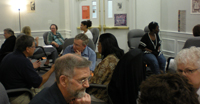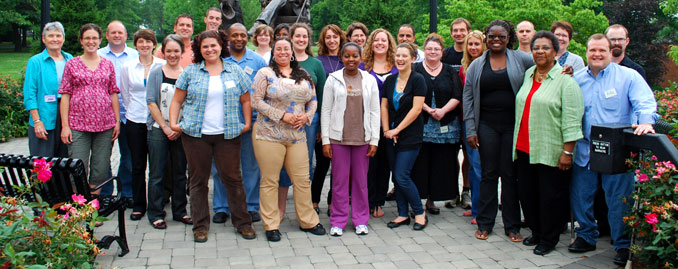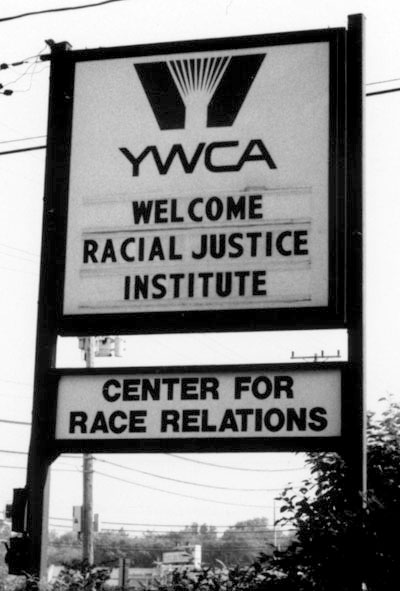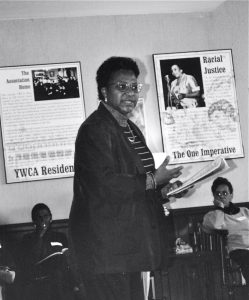cultural bridges to justice
What Is Its History?
The RACIAL JUSTICE INSTITUTE grew out of previous “Community For Justice” Projects © and “JUSTICE INSTITUTES” © first implemented by cultural bridges in 1992. These projects are community centered also, but included sexism, classism, heterosexism, ableism and other forms of oppression, in addition to racism. While the RJI gives serious attention to other forms of oppression, particularly their interconnections with racism, the clear focus is racism. The RJI was originally created for use by the YWCA of the USA and local YWCA associations in their communities, and is now sponsored by a variety of non-profit organizations.
What are the Objectives, Intended Outcomes and Design of the RJI?
PART ONE: FOUNDATION WORKSHOP © 1995
Objectives
- To provide a framework and common language for genuine dialogue about racism and to create an environment which encourages such dialogue.
- To clarify the historical, political and social context for racism in the U.S.
- To uncover the systemic linkages among racism, sexism, classism, ableism, heterosexism, anti-Semitism, ageism and all forms of oppression.
- To probe the reality and daily experience of personal and institutional racism, white privilege and internalized racism.
- To share cultural roots and pride.
- To offer individual participants opportunities to deepen their own awareness and understanding of racism, and their commitment to racial justice.
- To develop specific leadership skills, relevant strategies and “change teams” for challenging racism in agencies, institutions and local communities.
Design
- 2 – 3 Sessions of 3 days each (22 hours,) 36 participants
- 2 facilitators – one Trainer of Color and one White Trainer (For some sessions there may be 1 – 2 training interns.)
- All three days are interactive and experiential.
- A variety of teaching/learning modalities is used: small groups, fishbowls, interactive exercises, caucuses, lecture, graphics, music, poetry, and journaling.
- Time for cultural sharing is integral to the design and outcome.
- Includes a 100+ page workbook and a personal journal.
- The focus is on the personal impact of racism, white privilege and internalized racism.
Intended Outcomes
Upon successful completion of PART ONE – FOUNDATION WORKSHOP – participants will
- be familiar with language and a framework related to the historical, political and social realities of racism in the United States. The following are a few of the specific issues or topics participants will experience:
- Definitions of racism, stereotype, prejudice, white privilege, internalized racism
- The intersections and interconnections of all forms of oppression and privilege
- The Cage of Oppression
- The Cycle of Oppression
- Qualities of Allies
- Significant but usually unfamiliar historical events in U. S. racism.
- have participated in a caucus experience and have a better understanding of the separate experiences, work and responsibilities of People of Color or White People.
- shared their cultural roots and pride with other participants
- been introduced to a fundamental anti-racist, multi-cultural, organizational / institutional analysis model.
- have created a personal bond with one or several other participants with the potential for future anti-racism collaboration.
- leave the workshop with a tangible plan of action for themselves and/or their “change team.”
Comment
PART ONE is designed as a broad-based, community education experience. This is the workshop that the largest number of people will complete. (In most regions 1 – 3 PART ONES with 36 participants each is planned before scheduling a PART TWO.) MOST participants will NOT attend other RJI components. PART ONE offers an intense, personal and interactive experience. Participants from diverse segments of the community choose to commit this time and energy to learn from, challenge and work with others who share their sense of urgency about racial justice work.
This first workshop in the series creates opportunities to study, question and better understand the history, context and impact of racism on individuals and society. It devotes significant time to personal storytelling and active listening, both important tools for deepening people’s awareness of the realities of racism and their motivation to act against it.
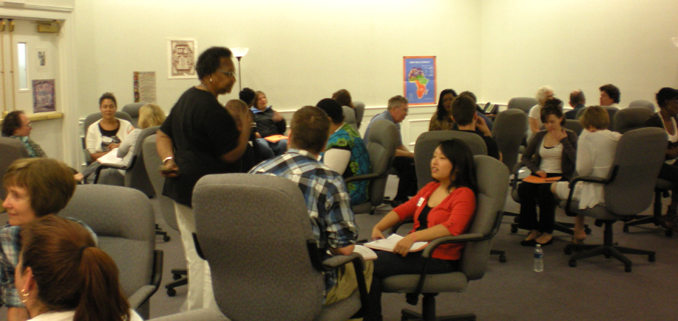
PART TWO – APPLIED SKILLS ©
Objectives
- To deepen participants’ knowledge of the roots and realities of racism, building on the Foundation Workshop.
- To prepare participants to translate and articulate this expanded knowledge to other members of the community.
- To analyze the personal, institutional and cultural manifestations of racism.
- To demonstrate and practice racism intervention techniques.
- To integrate the concepts and process of anti-racist, organizational and community development with the leadership skills and relevant strategies to be used by new and existing (organizational and community) “change teams.”
Design
- A 3 day session (22 hours,) 36 participants, 2 facilitators (For some sessions: 1 – 2 training interns.)
- All three days are interactive and experiential.
- A variety of teaching/learning modalities is used: small groups, fishbowls, interactive exercises, caucuses, lecture, graphics, music and poetry, and journaling.
- Includes a 60 page workbook.
- The focus moves to institutional and cultural racism, intervention and practical skills.
Intended Outcomes
Upon successful completion of PART TWO – APPLIED SKILLS participants will:
- possess information and fundamental understanding of the manifestations and differences among personal, institutional and cultural racism.
- be more confident and competent to articulate a variety of concepts, historical information and their own beliefs regarding racism and anti-racism.
- have practiced giving and receiving feedback and criticism related to questions and responses about racial issues.
- be prepared to identify their own and others’ styles of communication and conflict, and have tools to minimize the potential for misunderstanding resulting from different communication styles.
- have a deeper understanding of and new tools to address white privilege, internalized white supremacy and internalized racism.
- have practiced racism intervention techniques in group situations.
- have practiced institutional analysis of racist policies and practices through use of an organizational case study.
- leave the workshop with a tangible action plan for her/his “change team.”
Comment
PART TWO carries the work of PART ONE to another level. Often participants learn language, facts, concepts of racism in the first workshop that help to clarify many of their “gut feelings,” those things they “knew” but couldn’t clearly express. Having language and a deeper understanding does not necessarily translate, however, into the ability to articulate that understanding to someone else. Since communication to others is crucial for community anti-racism work, PART TWO offers additional conceptual learning, partnered with skills and practice for communicating this learning. In PART TWO the focus shifts from personal to institutional and cultural aspects of racism. More work is done on intervention and anti-racist organizational and community development.
The APPLIED SKILLS WORKSHOP also prepares people to move into the next RJI component: the TRAINING OF TRAINERS. Evaluation of past community models has shown a crucial need for a second level of training, with a skills focus, prior to programs as intensive as the TRAINING OF TRAINERS.
Dismantling Oppression / Forging Justice –
A Training of Trainers
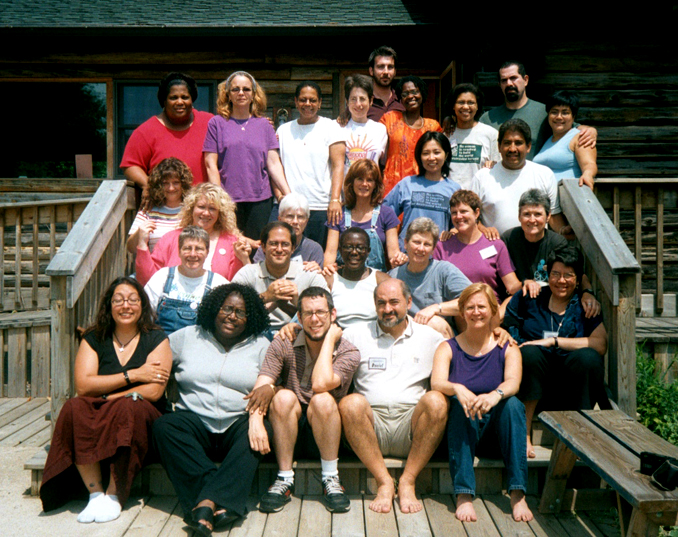
Objectives
- To examine adult learning principles and techniques.
- To study effective anti-racism workshop design.
- To model and practice facilitation skills for anti-racism/ racial justice programs.
- To integrate content areas with appropriate, accessible training modalities.
- To model and practice presentation and facilitation as a team.
- To deepen understanding of the impact of racism, white privilege and internalized racism on individuals, institutions and society.
- To develop greater understanding of personal attitudes and behaviors regarding racism and racial justice.
- To affirm participant’s personal growth and changed attitudes, and translate these experiences into tools for training.
- To develop a network of support and resources for future work as trainers.
Design
- 7 -10 days (may be held in 2 parts,) 24 participants, 2 – 3 facilitators, 1 – 2 interns.
- Includes a 400+ page Trainers Manual, plus other resources.
- Acceptance requires:
- Completion of FOUNDATION & APPLIED SKILLS WORKSHOPS
- Applicants have demonstrated during PART ONE and PART TWO their competency, confidence and comfort with the content material
- Participants apply in teams of two: one person of color and one white person.
- Accepted written application
- Telephone or other interview
- Accepted post-training work plan (Applicants must have a connection or alliance with one or more local institutions or community groups, with whom they will “contract” prior to the TRAINING OF TRAINERS to present a certain number of community/ organizational programs once their training is completed.)
Intended Outcomes
Upon successful completion of all components of the TRAINING OF TRAINERS, including evaluated presentation and facilitation sessions, each participant will
- be knowledgeable of and able to apply basic adult learning principles to all anti-racism presentations.
- possess written sample designs with objectives and an extensive “menu” of possible methods / modalities / activities for meeting those objectives. (Please, note: cultural bridges to justice TRAINING OF TRAINERS do not offer a script or other “cookie cutter” approach to anti-racism programs.)
- be able to design and present anti-racism programs of varying lengths (from introductory anti-racism programs a few hours long to replicating the 3 day FOUNDATION WORKSHOP) and for a variety of adult audiences.
- possess a repertoire of learning/teaching modalities and design strategies which are appropriate, audience relevant and effective in transmitting anti-racism content.
- have awareness and practice of group facilitation methods and skills and developed sensitivity to group process.
- be comfortable and competent to articulate each of the following racism / anti-racism content areas:
- Definitions of racism, white privilege, internalized racism, white supremacy, stereotype, prejudice.
- Historical, political and social realities of racism.
- Personal, institutional and cultural manifestations of racism in the U. S.
- Ally behavior and intervention skills.
- Intersections and interconnections of all forms of oppression & privilege.
- In-depth work on white privilege and internalized racism.
- Separate work of People of Color and White People (Caucus work)
- Basic anti-racist organizational development and assessment.
- All cultural bridges to justice “Working Assumptions” (see workbooks)
- The Cage and Cycle of Oppression.
- Communication, culture and conflict.
- The Four Faces of Racism
- The “Femtor” process.
- The Role of the Change Team.
- be able to work effectively and respectfully in a multi-racial training team, to understand training team dynamics related to both the audience and the anti-racism content, and to model anti-racist and ally behavior as a team.
- be capable of greater personal reflection and challenge regarding anti-racism, white privilege and internalized racism. Participants will also hold a deeper commitment to their own ongoing growth and development.
- be able to translate their personal reflections and challenges into effective and relevant training and presentation tools.
- be connected to a network of peers who can offer ongoing information, reference, feedback, evaluation, support and encouragement for continued growth, personally and as an anti-racism trainer.
- be familiar with the contents/ activities in the 300+ page TRAINERS MANUAL, and be able to adapt the materials to the needs of their future audiences.
- possess duplicating-ready handouts for many exercises.
- possess a written instrument for and be capable of performing thorough self-evaluation and needs assessment of their own learning and practice needs.
- possess a written instrument for and be capable of performing thorough evaluation and needs assessment of participants’ learning and practice needs.
Comment
This is an intensive training program designed to prepare graduates to facilitate organizational and community programs on anti-racism, from short programs for service clubs to the 3 day FOUNDATION WORKSHOPS*. Following the TRAINING of TRAINERS, the new Trainers! will have opportunities, when practical, to intern at other FOUNDATION WORKSHOPS and/or other programs to begin practicing their skills. One of the recurring challenges of Training of Trainers (on topics as difficult and emotional as racism) is the lack of support and practice time following the training. Most new trainers feel unsure of their skills without a period of supported and evaluated practice. The intern program is designed to offer this feedback and support.
At the completion of the TRAINING OF TRAINERS each participant will be offered a thorough evaluation of their areas of strength and challenge. They will be given suggestions for further study and practice related to content areas, as well as platform and facilitation skills. All participants enter and leave such a training at varying levels of competence and comfort. cultural bridges to justice trainers will assist each participant in assessing their readiness to train and suggest a focus for their continuing education and practice.
* All participants who complete the TRAINING OF TRAINERS should be able to begin training at some level immediately. While the objective of this intense training is to prepare every participant for potential facilitation of FOUNDATION WORKSHOPS, some participants may self-assess or be assessed by cultural bridges to justice trainers as needing further study or practice before attempting those 3 day programs.
Once the new trainers are presenting regularly in the community or for their institution, peers from their training group will be available for support and periodic evaluation. While trainers will work primarily with one or two other trainers, varying combinations among the training group will help meet more program needs in the community.
Racial Justice Programs
All Program Topics
If 40 people (strangers) can come together and bond, share ideas, thoughts and feelings about the “isms”, then there truly must be hope.
—Workshop participant
Excellent – first time I experienced a diversity / anti-racism workshop where I didn’t feel blamed or shamed. Thanks. It’s possible and makes me feel we can work together.
—From a white workshop participant
I have been fortunate to attend many workshops during my life – for both professional and personal development. This one will leave the most lasting impression and was clearly the best.
—RJI participant
I have never enjoyed a diversity seminar as much as this one, and I’ve attended many. The environment you created, the way you brought us all together, the trainers, were excellent. I would encourage any organization or community to attend.
—Bell Atlantic Manager, RJI
I am thankful for the YWCA for sponsoring the Racial Justice Institute. I am particularly thankful that as a white man I was not treated as the enemy, but as an ally in the struggle for racial justice.
—Minister and Commission on Homelessness, Erie County, PA
In answer to the question “what one memory will you carry with you from the workshop?” “that I did not really see People of Color. In my justifications, I believed I was being fair.”
—From a white participant
The one feeling I will take away with me is that from this moment on, if I do not do anything about racism, I am allowing it to be done in my name.
—Workshop participant
